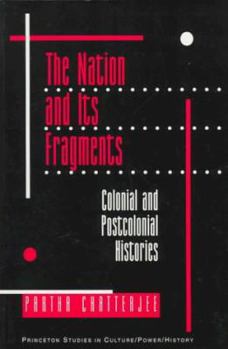The Nation and Its Fragments: Colonial and Postcolonial Histories
Select Format
Select Condition 
Book Overview
In this book, the prominent theorist Partha Chatterjee looks at the creative and powerful results of the nationalist imagination in Asia and Africa that are posited not on identity but on difference with the nationalism propagated by the West. Arguing that scholars have been mistaken in equating political nationalism with nationalism as such, he shows how anticolonialist nationalists produced their own domain of sovereignty within colonial society...
Format:Paperback
Language:English
ISBN:0691019436
ISBN13:9780691019437
Release Date:October 1993
Publisher:Princeton University Press
Length:296 Pages
Weight:0.95 lbs.
Dimensions:0.7" x 6.1" x 9.2"
Customer Reviews
3 ratings
Worthwhile study
Published by Thriftbooks.com User , 22 years ago
Chatterjee is a typical `postmodern' scholar, and he has a rather jargon-filled and oblique writing style. In some cases, knowledge of Indian and Bengali history, to say nothing of familiarity with contemporary Bengali society and the intricacies of the caste system, would seem to be required to truly understand certain sections of this book. Also, while Chatterjee states that his argument is meant to clarify (to some extent) the conditions of nations, nationalism and society/communities in the postcolonial states of Asia and Africa, his examination is almost exclusively restricted to Bengal in India. There is nothing wrong with this as such, since he deals with the area with which he is most familiar. However, one of his principal underlying themes is a (rather persuasive) criticism of European or `Western' scholars for mis-applying European philosophies and sociological models to non-European, postcolonial societies, and he seems to commit the same error by assuming that his Bengali example can be used to explain circumstances in the vast, diverse lands from the western shores of Africa to southeast Asia.Nevertheless, "The Nation and Its Fragments" is a very strong argument against simply assuming that nationalism, postcolonial development, industrialization and modernity itself in India (or elsewhere in the so-called `Third World') are simply following `models' already formulated in Europe/America. Chatterjee's most important point is perhaps his call for scholarship on postcolonial societies to commence from completely different fundamental assumptions, rather than trying to force upon it outside (read European) `scientific' models.
An alternative view of nationalism
Published by Thriftbooks.com User , 23 years ago
Pranab Chatterjee wisely cautions us to remember that there are ways of expressing nationalism that differ from the Western models. With examples from literature and history the author helps us explore the "inner" spiritual or cultural world of Bengalis in colonial India, a world they tried to keep safe and distinct from the "outer" world of British-imposed politics. The writing in places is a bit vague, but the reading is worth the effort to remind us that wisdom does not begin and end in the West.
This book,like many others, pleads for acceptance.
Published by Thriftbooks.com User , 26 years ago
The text is one of many in the field. It is asking to be accepted in the domains of the (white Western) colonial overlord, while, at the same time, attempting to mount a palace coup. These ex-colonials, who so eloquently plead from the "margins" are really to be pitied. They are NOT on the perameter; they are right there at the center, with Homi B Babha and Stewart Hall etc





